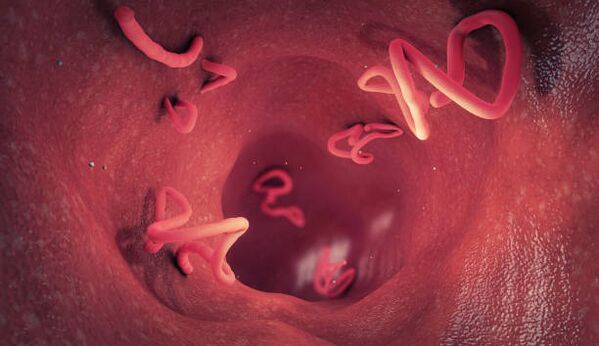Worms are worms that live a parasitic lifestyle on the body of their host, a human being. It does not matter the age. Both adults and children are equally susceptible to infection. The classification of helminthiasis is very wide, especially in countries with hot climates.

There are 3 classes of parasitic worms:
- roundworms (nematodes) - pinworms, roundworms;
- tapeworm (cestodes) - pig tapeworm, bovine tapeworm, echinococcus;
- flatworms, larynx (trematodes).
The most common worms in children are pinworms, which cause enterobiosis. These helminths are small, up to 1 cm on average, white-gray with a curved body. The location of these parasites is the large intestine, but they can also penetrate the lower part of the small intestine. Pinworms multiply on the skin near the anus. At night, female pinworms often penetrate the labia of girls, ending with infectious diseases of the genitals, and lay eggs in the folds of the skin. In general, these helminths live about 1-1, 5 months. The process of self-infection in a child can cause the anxiety to last for many years. Parasites can be found in the stool with the naked eye.
Roundworms are another type of worm that is most common in children. From a characteristic species up to 15 cm in length, these nematodes move into a moving piece of food and settle in the lumen of the small intestinal loops. Roundworms rarely enter the feces. The female periodically releases eggs, which can be found in the stool analysis. However, if it is not found during the study, it does not mean that the child is not infected. The life cycle of a roundworm can last several years.
Reasons
The baby's interest is realized with his fingers, the child, who learns the world, actively touches everything that falls under his arm, and immediately sucks in his mouth, longing for strength and taste. Thus, pinworm eggs safely enter the digestive system of future small owners.
When a child drinks contaminated water, he gets worm eggs from the surface of unwashed fruit. Very often, the infection occurs when interacting with animals or playing on a sandpit, where cats and dogs want to solve their physiological problems. After the walk, children often do not wash their hands, and all the dirt gets into their mouths, along with parasitic eggs.
Symptoms
If a child is infected with a large number of parasitic worm eggs, there may be a sharp deterioration within a few days. In milder cases, the first symptoms of the invasion appear after a few weeks or even months. Much depends on the child's immunity. Can cope well with parasites and limit their development. However, the defenses gradually decrease and the helminths infect the body and cause serious problems.
The first symptoms are symptoms of poisoning (intoxication). The vital activity of worms is accompanied by the release of a large number of animal poisons that can poison the child's body. In the gut, parasitic worms use nutrients, resulting in a gradual deficiency of protein, carbohydrates, fats and vitamins in the baby.
In the child:
- lose weight
- pale skin,
- weakness, frequent dizziness,
- increase in body temperature, headache,
- bad sleep
- tears
- depressed mood.
Intestinal diseases manifest themselves - constipation, loose stools, rumbling and pain in the abdomen, nausea and vomiting, painful sensations and swelling in various parts of the abdomen. The disease may be accompanied by allergic conditions: itching, rash, cough, inflammation of the mucous membranes of the respiratory tract. Weakening of immunity leads to the addition of infectious diseases.
Diagnosis and treatment
Diagnosis of feces helminthiasis is very difficult. This is due to the fact that roundworm eggs or pinworms do not appear in the feces every day, and the smear microscopy method requires a lot of attention. For worm eggs, it is recommended to take at least 3 consecutive days to increase the reliability of fecal analysis.
In case of increased risk of worm infection (contact with animals, playing on the ground or in open pits, taking something in the child's mouth, biting nails or licking fingers, etc. ), in addition to a three-fold stool analysis, It is recommended to be examined.
In the presence of allergic manifestations of unknown origin, an increase in the number of eosinophils in the blood test, persistent intestinal dysbiosis, it is advisable to donate blood for the appointment of class E immunoglobulins (Ig E and G) for roundworms and other helminths. . You can check your pets for worms.
Assessing the total value of indirect symptoms and anamnesis, the doctor may recommend antihelminthic therapy without direct evidence of the presence of worms in the child, except for other pathologies that cause similar clinical manifestations. focus on infecting each other with helminth eggs. In this case, in addition, it is necessary to strengthen hygiene measures, especially to boil and iron the bed and personal sheets on both sides.
























